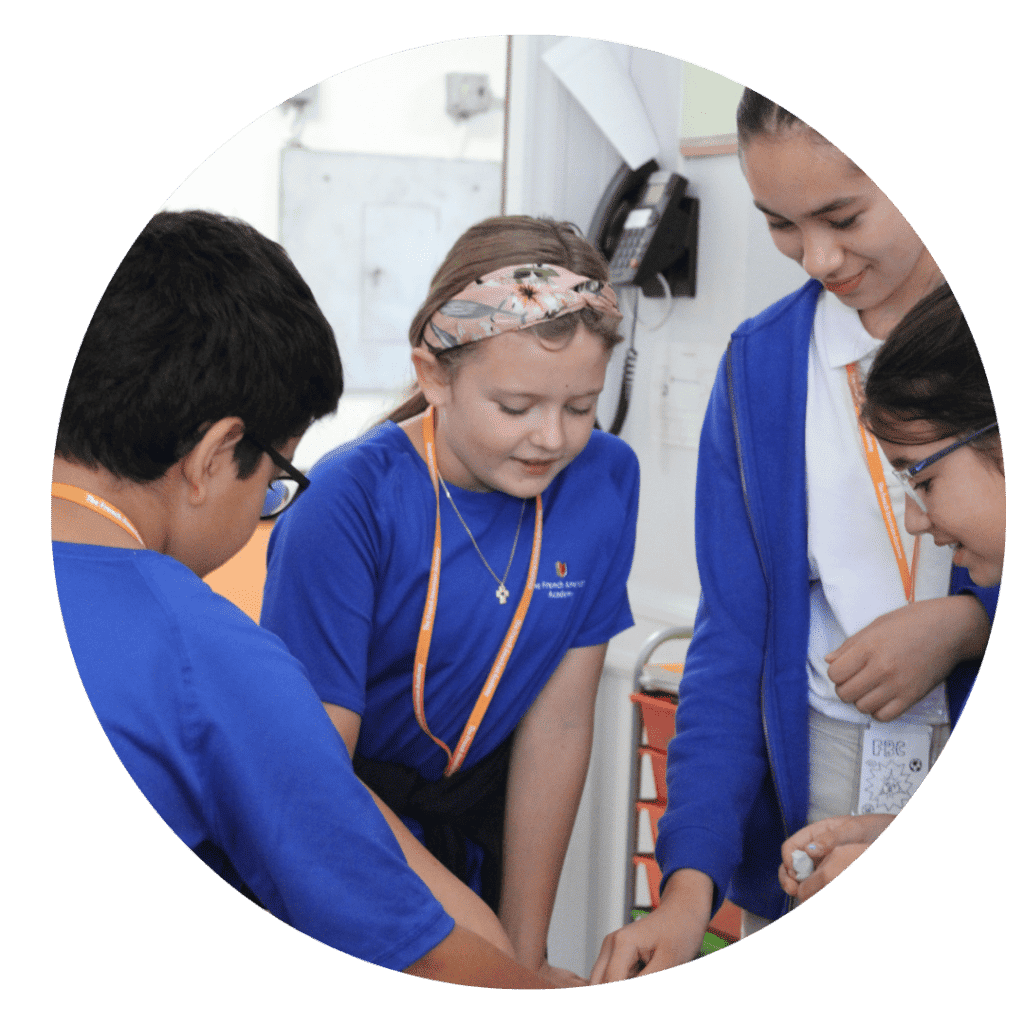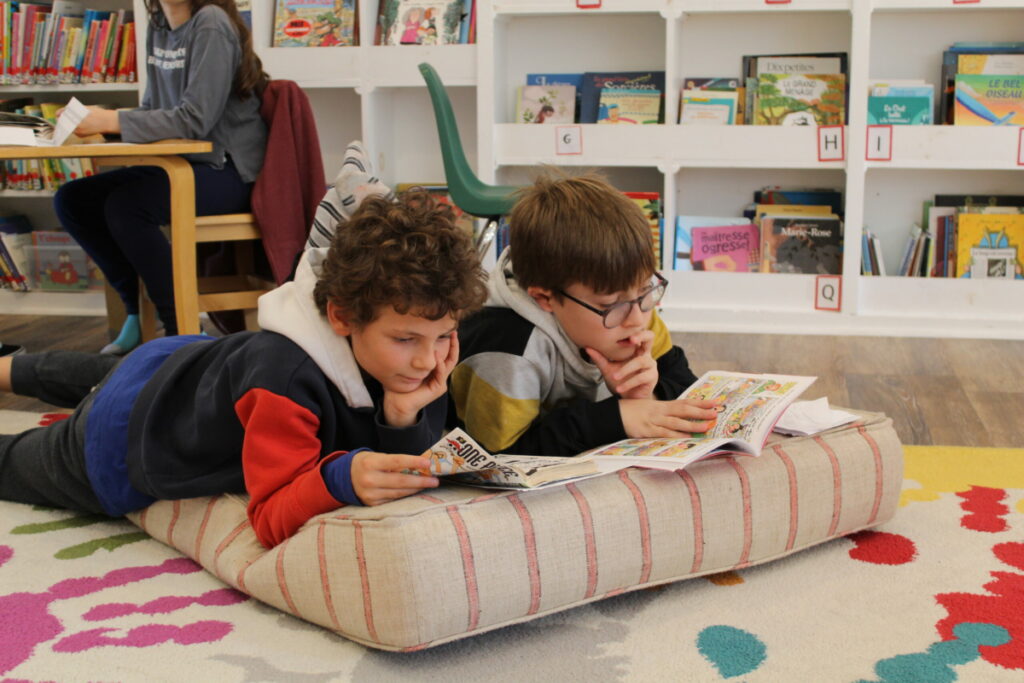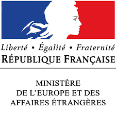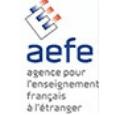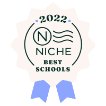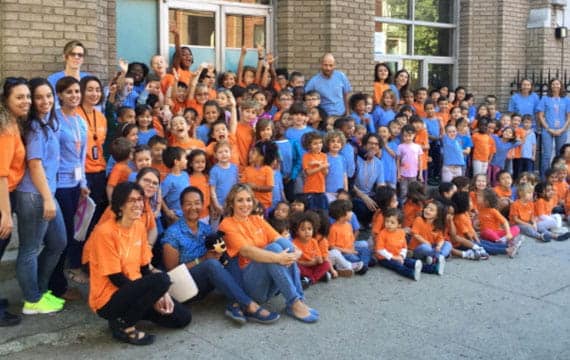Elementary School
Our Approach
In Elementary School at the French American Academy, our bilingual curriculum gives students a proven path to academic and personal success. First, it includes measurable progress in core skills like reading, writing, math, and science. Second, but equally important, it provides students with superior cognitive development and social-emotional growth through various aspects of academic life.
The Elementary curriculum develops bridges between the French Ministry of National Education program and the US Common Core to ensure students build a strong foundation for success in middle and high school and beyond.
Two Tracks Available in Elementary School
Bilingual Track
Available on the Englewood and Jersey City campus.
This is the natural continuity of your child’s bilingual elementary education received at the French American Academy, another French-American school, or any school where French is part of the regular curriculum. Prior knowledge of French is required for admission.
Accelerated French Program
Available only on the Englewood campus.
The Accelerated French Program is designed to prepare students with no prior French to eventually transition into the bilingual track.
Admissions Requirements:
- Strong English language skills, which will be assessed during the admissions process.
Demonstrated ability to learn quickly, along with a willingness and interest in learning a new language.
*Students who are bilingual or demonstrate strong language aptitude are considered strong candidates for the program.
Elementary School Curriculum
To give students a strong start in math and build their confidence, our elementary curriculum uses two effective methods: Singapore Math and engaging Math Routines.
Building Deep Understanding with Singapore Math: This research-based approach helps students truly grasp the underlying principles of math, moving beyond mere memorization of rules. Students learn the “why” behind the “how” of math through a three-step process: concrete, pictorial, and abstract learning. They explore math concepts using hands-on activities, visual models, and real-world applications. This step-by-step method helps them truly understand numbers and build strong problem-solving skills that will last. Students will also learn to visualize problems and connect math to their everyday lives.
Developing Flexible Thinking with Math Routines (MitC): Alongside Singapore Math, we incorporate engaging Math Routines. Math Routines reinforce mathematical flexibility and reasoning by encouraging students to approach problems in multiple ways. Through real-life contexts, collaborative discussions, and open-ended investigations, students develop a sense of number relationships, strategic thinking, and confidence in tackling complex problems. This approach also emphasizes the use of visual models and representations, helping students make connections between different strategies and deepen their understanding of mathematical concepts.
At the elementary level, our reading and writing program is built on foundational strategies that support the development of confident, capable readers and writers.
Syllabic Method: The syllable method is a method that starts teaching reading at the beginning by presenting words that have been arranged into syllables. The syllables are arranged into the last word, stringing the words into sentences. When the reader breaks the words into syllables or smaller units it develops their syllabic analysis. For example, /mitochondria/ can be divided into /mi/-/to/-/chon/-/dri/-/a/, all identifiable syllables for a beginning reader. By breaking the word apart the student can correctly pronounce a difficult word. This helps our emergent readers to be able to string together sounds to make meaning from the words they are deciphering.
Writer’s Workshop: In Writer’s Workshop, we utilize a framework that is crafted to teach writing using repetitive steps. Writing time for each day is broken down into 3 main components: mini lesson, writing time, and sharing. It is a consistent method in the classroom that helps to introduce, practice, and improve writing skills for the students. For the mini lesson, the teacher offers direct instruction to the whole class on a specific writing skill. This may include topics such as crafting a great lead, using proper punctuation, adding details to a story, or building story suspense. The students go on to practice this skill independently and then share their work orally either in small groups or with the whole class.
There are 3 types of writing we focus on: opinion writing, expository writing, and narrative writing. The framework is the same for all writing topics, so the students learn to build good writing skills no matter the writing style they’re working on. Checklists and rubrics tailored to each writing topic help students to stay on track and identify where they are in their writing process. Teachers confer with students along the way to observe their progress and give precise feedback. Students can then create writing goals to aid them in their writing progression over the course of the school year.
Elementary school’s French and English teachers teach together to help students build bridges between the two languages. Through the MAK method developed by Marianne Verbuyt, students will take the time to study the structure of each language and compare them. Marianne Verbuyt’s method includes visual tools to make this learning process easier, more engaging, and more effective. With this well-designed and thoughtful approach for syntax, punctuation, and prosody, the students develop a stronger mastery of both French and English.
Strong speaking skills are a cornerstone of our elementary curriculum because we know that when children can express themselves confidently, it enriches their reading and writing abilities. Students have numerous exciting opportunities to hone these skills and shine as speakers.
For example, they’ll participate in:
- Bilingual Language Workshops: Designed to target and strengthen oral communication skills in both French and English.
- Bilingual Oral Presentations (starting in 1st grade): Students have frequent opportunities to present their projects bilingually throughout the year, often during classroom presentations, special events, and family-invited showcases. The 5th Grade Exit Project celebrates this development, as students choose a topic of interest and independently conduct research, write an analysis, and deliver a bilingual presentation in French and English before teachers, peers, and parents.
- Theatrical Performances: Through our yearly End-of-Year Show and other student theatrical opportunities, students develop their expressive speaking and presentation skills.
- Model United Nations (UN) Club: An opportunity to research global issues, articulate arguments, and develop public speaking skills.
- Elected Participation in Student Council: Empowering students to effectively convey their ideas and represent their peers.
- Eco-Delegates elections, workshops, and other initiatives.
The Elementary School Science curriculum blends units of study from the French and American systems. Science classes are taught bilingually with both a French and an English classroom teacher delivering instruction together. In the upper grades (4th and 5th) a trained American science teacher works with the French classroom teacher to plan and carry out science instruction.
The science curriculum aims to foster excitement and enthusiasm for discovery and concept building. The scientific method, questioning, observation, and data collection are utilized to investigate relevant, age-appropriate science concepts. Students often work in groups to foster skills of collaboration and communication. In the older grades, project-based learning is also used to delve deeper into topics. Projects might include designing and building structures such as a sustainable school, a working water wheel, and a water filtration system. The 17 United Nations Sustainable Development Goals are woven into the curriculum to prepare students to become active citizens in our interconnected world.
Our STEM curriculum focuses on developing essential skills for the future: real-world problem-solving, creativity, and collaboration.
Beginning with fun, age-appropriate tools like BeeBots, Ozobots, and Scratch Jr, students learn foundational coding concepts, directional thinking, and sequencing through both digital and unplugged activities.
As they advance, they explore more complex platforms such as Scratch, Dash, and ProBots, deepening their understanding of algorithms, loops, and debugging, all while designing games, choreographing robot movements, and solving tangible challenges.
Engineering is woven throughout the curriculum. Younger students design and build simple objects using basic materials. As they grow, they tackle more complex design challenges, working in teams to imagine, prototype, and refine technical solutions. They’re using Tinkercad to design and print objects with the 3D Printers.
Through interactive projects like treasure hunts, obstacle courses, and collaborative design tasks, our students not only learn technology but also use it to create, explore, and express themselves.
In addition, students learn how to use Chromebooks and essential Google tools safely and effectively, preparing them for digital fluency.
Learn more about our STEM classes and hands-on projects here.
Art curriculum raises interest, confidence, and makes children sensitive to beauty in their environment and beyond.
Through hands-on activities such as drawing, painting, collage, and sculpture, students learn diverse artistic techniques. These explorations are often inspired by the styles of renowned artists, from Leonardo da Vinci, Gustav Klimt, Douanier Rousseau to contemporary figures. The curriculum introduces art history through engaging stories and media, while also highlighting connections between art and other subjects like literature and history. Imagination and narrative play a central role, with projects drawing inspiration from poetry, mythology, and even architectural concepts.
As students advance, they develop their ability to analyze and reinterpret artworks, discuss them using appropriate art vocabulary, and explore various media, including shadow theaters and model making. They encounter a wide spectrum of art history, spanning ancient civilizations to modern and contemporary artists like Alexander Calder. Finally, communicating about the art process is also an essential part of the curriculum.
Music offers a progressive and engaging musical journey from the early preschool years through to upper elementary grades. Students explore a rich variety of musical genres and traditions through listening, movement, singing, and instrument play. Through the discovery of famous musical works, instruments, and sounds from around the world, children develop their musical ear, rhythmic sense, and vocal technique in age-appropriate ways.
The curriculum grows with the students, from learning basic rhythms and songs in preschool to reading music, recognizing musical intervals, and playing the ukulele in elementary grades. Emphasis is placed on creativity, collaboration, and musical expression, with measurable goals that ensure students steadily build musical confidence and competence each year.
Physical Education at the elementary level focuses on developing students’ fundamental motor skills, coordination, and physical confidence through playful and structured activities.
The program emphasizes teamwork, cooperation, and respect, while helping students build healthy habits and a positive attitude toward physical activity.
Each grade level is introduced to age-appropriate units such as locomotor skills (running, jumping, hopping), ball games, dance, circus, introductory team sports, and racket sports. Activities are designed to be inclusive, fun, and promote both physical well-being and social development.
Learning Beyond the Classroom
Field Trips
Examples of past trips:
The 2nd and 3rd graders spend three days and two nights in the Catskills or in Connecticut. Animals and habitats, sustainable development, recycling and compost, and the “Flying Squirrel” are among the highlights of the trip.
The 4th and 5th graders travel for a complete week. In other words, they are out for 5 days and 4 nights. Typically, we alternate between two trips :
- A one-week trip to Quebec, Canada, for the cultural connection
- A historical trip to Boston and Plymouth for the social study curriculum.
“This was the best time of my life” was a repeated exclamation from participants upon their arrival back in NJ. Read more on field trips by visiting out field trips page.
Benefits of Field Trips
Educational Trips are a lot of fun! But beside this obvious benefit, there are many others that come into play. Among them, you can find :
- Developing cohesion among the group
- Building confidence
- Developing a sense of autonomy and responsibility
- Proposing different ways of learning
- Living an unforgettable adventure with classmates!
Discover What's New in Elementary School
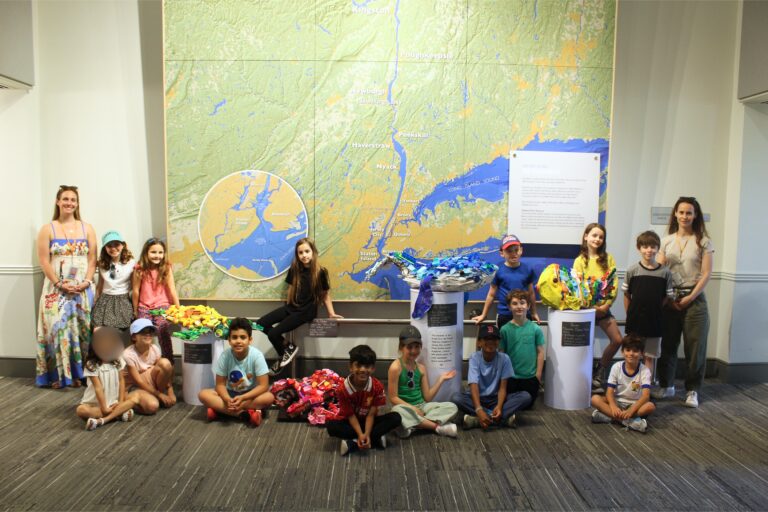
3rd Grade Student Art Exhibit on Display at Liberty State Park Nature Center
The third-grade students have spent the spring confronting an uncomfortable truth: the ocean is drowning in plastic. As part of

A Season of Learning: Supporting Summer Reading Goals
For students entering second grade and up, the French American Academy teachers assign summer reading tasks, activities, and challenges to

The Exit Project
What is the Exit Project? Every year, our 5th-graders end the school year with an Exit Project. But what is
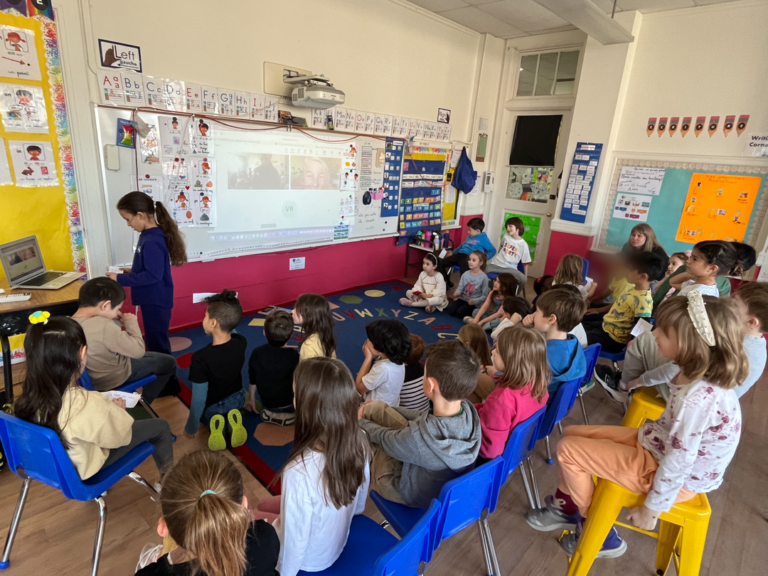
What Is the Albertine Prize for Kids?
Every year, French American schools across North America take part in the Albertine Prize for Kids, a unique bilingual reading
📘 Bilingual education, redefined.
At the French American Academy, our students don’t just learn in two languages, they think in two systems.
With the latest updates to the French national curriculum, our bilingual classrooms are now even more intentional, structured, and future-ready.
From a stronger focus on oral language and vocabulary to earlier exposure to problem-solving and pattern recognition in math, these changes are designed to support how children really learn step by step, stage by stage.🧠
In Cycles 1 and 2 (Preschool to Grade 3), the curriculum now outlines clearer age-based milestones, emphasizes context-based learning, and introduces advanced concepts like fractions and mental math earlier without sacrificing comprehension.🎓
Paired with the US Common Core, this dual framework helps students develop deep language fluency and mathematical thinking. It’s a powerful combination that equips them with the skills to reason, express themselves, and thrive academically in any environment.🌍
Bilingualism at FAA isn’t just about speaking two languages. It’s about building sharper minds, stronger foundations, and global citizens right from the start.📖
🔗 Read more on our blog: The New French Curriculum Updates at FAA – https://faacademy.org/the-new-french-curriculum-updates-at-the-french-american-academy-whats-new-for-your-child/
#BilingualEducation #FrenchCurriculum #FrenchAmericanAcademy #DualLanguageLearning #EarlyEducation #CognitiveDevelopment #AcademicExcellence #FrenchSchoolNJ #InternationalEducation #BilingualBrains #LearningInContext #FutureReadyKids

📘 Bilingual education, redefined.
At the French American Academy, our students don’t just learn in two languages, they think in two systems.
With the latest updates to the French national curriculum, our bilingual classrooms are now even more intentional, structured, and future-ready.
From a stronger focus on oral language and vocabulary to earlier exposure to problem-solving and pattern recognition in math, these changes are designed to support how children really learn step by step, stage by stage.🧠
In Cycles 1 and 2 (Preschool to Grade 3), the curriculum now outlines clearer age-based milestones, emphasizes context-based learning, and introduces advanced concepts like fractions and mental math earlier without sacrificing comprehension.🎓
Paired with the US Common Core, this dual framework helps students develop deep language fluency and mathematical thinking. It’s a powerful combination that equips them with the skills to reason, express themselves, and thrive academically in any environment.🌍
Bilingualism at FAA isn’t just about speaking two languages. It’s about building sharper minds, stronger foundations, and global citizens right from the start.📖
🔗 Read more on our blog: The New French Curriculum Updates at FAA – https://faacademy.org/the-new-french-curriculum-updates-at-the-french-american-academy-whats-new-for-your-child/
#BilingualEducation #FrenchCurriculum #FrenchAmericanAcademy #DualLanguageLearning #EarlyEducation #CognitiveDevelopment #AcademicExcellence #FrenchSchoolNJ #InternationalEducation #BilingualBrains #LearningInContext #FutureReadyKids
…
🌍 International Education Tuesday 🌍
This year, Margaux’s mom Amy came to our 2nd-grade class to share her experiences traveling across 10 countries in Africa through her humanitarian work. 🌍🇰🇪🇬🇭
Thanks to Amy and Margaux, our students got to see and touch traditional clothing, jewelry , handmade baskets, and even taste plantain chips and Ghanaian chocolate bringing global cultures right into the classroom.
Through these family-led presentations, our students don’t just learn about the world, they connect with it, developing cultural awareness, curiosity, and a deeper understanding of others. 💬🌱🗺️
Thank you, Amy, for this meaningful exchange!
#InternationalEducation #BilingualSchool #GlobalClassroom #FrenchAmericanAcademy #CulturalAwareness #WorldReadyKids #DiversityInEducation #2ndGradeExplorers

🌍 International Education Tuesday 🌍
This year, Margaux’s mom Amy came to our 2nd-grade class to share her experiences traveling across 10 countries in Africa through her humanitarian work. 🌍🇰🇪🇬🇭
Thanks to Amy and Margaux, our students got to see and touch traditional clothing, jewelry , handmade baskets, and even taste plantain chips and Ghanaian chocolate bringing global cultures right into the classroom.
Through these family-led presentations, our students don’t just learn about the world, they connect with it, developing cultural awareness, curiosity, and a deeper understanding of others. 💬🌱🗺️
Thank you, Amy, for this meaningful exchange!
#InternationalEducation #BilingualSchool #GlobalClassroom #FrenchAmericanAcademy #CulturalAwareness #WorldReadyKids #DiversityInEducation #2ndGradeExplorers
…
📊 Math Monday: Building Data Literacy in Elementary School
This year in math, students are diving into data! Through hands-on work with picture graphs and tally charts, they`re not just learning how to read information, they’re learning how to analyze it.
By conducting their own surveys, collecting data, and creating visual representations, students are developing core skills in statistical reasoning, comparison, and pattern recognition.
These foundational skills are essential for success in STEM fields and help strengthen logical thinking from an early age.
Data isn’t just numbers, it’s a way to make sense of the world. And our students are learning how to ask questions, gather evidence, and communicate their findings with confidence!
#MathMonday #STEMlearning #ElementaryMath #DataLiteracy #VisualLearning #SingaporeMath #FrenchAmericanAcademy #MathEducation #AcademicSkills #FutureReadyKids #BilingualSchool #HandsOnLearning

📊 Math Monday: Building Data Literacy in Elementary School
This year in math, students are diving into data! Through hands-on work with picture graphs and tally charts, they`re not just learning how to read information, they’re learning how to analyze it.
By conducting their own surveys, collecting data, and creating visual representations, students are developing core skills in statistical reasoning, comparison, and pattern recognition.
These foundational skills are essential for success in STEM fields and help strengthen logical thinking from an early age.
Data isn’t just numbers, it’s a way to make sense of the world. And our students are learning how to ask questions, gather evidence, and communicate their findings with confidence!
#MathMonday #STEMlearning #ElementaryMath #DataLiteracy #VisualLearning #SingaporeMath #FrenchAmericanAcademy #MathEducation #AcademicSkills #FutureReadyKids #BilingualSchool #HandsOnLearning
…
🌎 Summer Camp Week 2 Recap: From the Caribbean to Every Continent!
📍 At the Jersey City campus, our theme was The Caribbean, and campers brought it to life through language, music, storytelling, and science.
🏴☠️ PK campers dove into a Pirates of the Caribbean experience! They learned pirate and Caribbean-themed vocabulary in French, crafted spyglasses, and cooled off at the water park.
They also attended a special saxophone performance by our very own Mr. Alex (FAA’s piano teacher and professional jazz saxophonist) and Camp Director Khalid after learning about Adolphe Sax, French composers, and the saxophone’s evolution in American music.
🍍K to 4th grade campers expanded their cultural knowledge with a tropical fruit tasting, learned popular games from Guadeloupe (where their teacher Marie-Françoise is from), and participated in a beginner Creole session.
Their week also included STEM explorations like volcano models and string phones!
All of this, topped off with water play and music, made for a vibrant, multisensory week!
📍 At our Englewood campus, the theme was Explorateurs du Monde – World Explorers, with each day focused on a different region: Africa, Europe, Asia, and the Americas.🌍
Campers traveled the world through traditional games (like sack races, pétanque, and hopscotch), cultural crafts, global music, and culinary workshops.
They created their own personalized tote bags and finished the week with American-inspired cooking and games. Each activity was designed to introduce campers to cultural symbols, sounds, and tastes, building awareness, curiosity, and respect for diversity.
🎨 From painting African landscapes to making maracas with rice and recycled bottles, and from watching Ponyo on Asia Day to exploring the cultural symbolism of maize on America Day, students developed creativity and global understanding through hands-on learning.
Every day ended with joyful water games, perfect for summer fun!🧠
Whether discovering how volcanoes erupt or what language pirates spoke in French, our students are building global perspectives while strengthening language skills, curiosity, and collaboration.

🌎 Summer Camp Week 2 Recap: From the Caribbean to Every Continent!
📍 At the Jersey City campus, our theme was The Caribbean, and campers brought it to life through language, music, storytelling, and science.
🏴☠️ PK campers dove into a Pirates of the Caribbean experience! They learned pirate and Caribbean-themed vocabulary in French, crafted spyglasses, and cooled off at the water park.
They also attended a special saxophone performance by our very own Mr. Alex (FAA’s piano teacher and professional jazz saxophonist) and Camp Director Khalid after learning about Adolphe Sax, French composers, and the saxophone’s evolution in American music.
🍍K to 4th grade campers expanded their cultural knowledge with a tropical fruit tasting, learned popular games from Guadeloupe (where their teacher Marie-Françoise is from), and participated in a beginner Creole session.
Their week also included STEM explorations like volcano models and string phones!
All of this, topped off with water play and music, made for a vibrant, multisensory week!
📍 At our Englewood campus, the theme was Explorateurs du Monde – World Explorers, with each day focused on a different region: Africa, Europe, Asia, and the Americas.🌍
Campers traveled the world through traditional games (like sack races, pétanque, and hopscotch), cultural crafts, global music, and culinary workshops.
They created their own personalized tote bags and finished the week with American-inspired cooking and games. Each activity was designed to introduce campers to cultural symbols, sounds, and tastes, building awareness, curiosity, and respect for diversity.
🎨 From painting African landscapes to making maracas with rice and recycled bottles, and from watching Ponyo on Asia Day to exploring the cultural symbolism of maize on America Day, students developed creativity and global understanding through hands-on learning.
Every day ended with joyful water games, perfect for summer fun!🧠
Whether discovering how volcanoes erupt or what language pirates spoke in French, our students are building global perspectives while strengthening language skills, curiosity, and collaboration.
…
Testing in Elementary School
“Sometimes, the most brilliant and intelligent minds do not shine in standardized tests because they do not have standardized minds.” – Diane Ravitch | (FAA Testing Philosophy)
Testing at the French American Academy serves as a benchmark to demonstrate the effectiveness of our bilingual approach.
We chose MAP Assessment in English as it stands for Measure of Academic Progress, emphasizing the importance of progress versus achievements.
We do not solely focus on preparing students for assessments, as tests do not prepare students for the real world. However, we recognize the importance of preparing our students to take tests and manage the stress that comes with it. While testing is a part of life, it does not measure fundamental qualities like curiosity and empathy, which are essential for a child’s growth.
Encouraging children to take calculated risks, learn from their mistakes, and understand that growth comes from failures is the best way to set them up for success in life.

What is MAP? Measures of Academic Progress (MAP) is a computerized adaptive assessment program in English that provides FAA educators with the information they need to improve teaching and learning and make student-focused, data-driven decisions.
To who and when are MAP assessment given?
Students in grades 1 through 8 are tested two times per year in math, reading, and language usage. Students complete their 1st assessment in October to establish their starting benchmark.
In June, students complete the 2nd MAP assessment to measure how much they have progressed over the year. Educators use the growth and achievement data from MAP to develop targeted instructional strategies and to plan school improvement.
Why is it useful?
What matters for us at the French American Academy is to see students grow and reach their full academic potential. Therefore, choosing MAP testing came as a natural choice. After each assessment, teachers are provided with accurate, actionable evidence to help inform instructional strategies regardless of how far students are above or below grade level.
| Learn More |
French National Evaluation
As a private school accredited by the French Government, we are following the recommendations from the Ministry of National Education in terms of standardized tests. Therefore, in September, 1st and 2nd graders are taking a test in Math, Reading and Writing like any other 1st or 2nd graders who live in France.
DELF Exam
What is DELF? The DELF exam assesses four language skills: listening comprehension, reading comprehension, speaking skills, and writing skills.
How is it taken?
3rd, 5th, and 8th-grade students at the French American Academy take the DELF exam (Diplôme d’études en langue française). Official diplomas are awarded by the French Ministry of Education for proficiency in French as a Foreign Language.
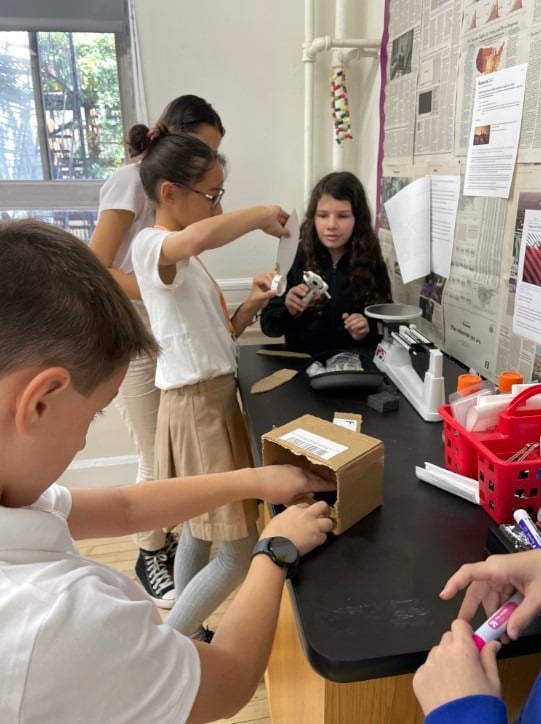
Enrichment Program
Discover, Play, and Learn
Our after-school enrichment program offers elementary students a variety of activities to discover new interests and have fun. From gymnastics and chess to piano and lego robotics, we aim to nurture a love for learning outside the classroom.
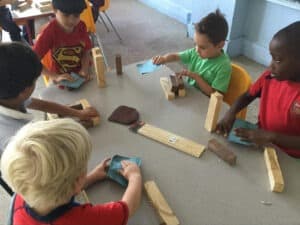
Elementary School FAQs
In Elementary school at the French American Academy, French proficiency is not a requirement However, for students in 1st grade and up, we offer two French language tracks to choose from! The Bilingual Track does require some prior knowledge of French, while in the Accelerated French Track students do not need to know any French. But don’t worry, we understand that language learning can be challenging and offer additional support to ensure all of our students succeed. Plus, our nurturing environment is perfect for helping students thrive and reach their full potential.
In Elementary school at the French American Academy, all of our French teachers are from countries where French is the official language and speak French as their native language and all our English teachers are native English speakers.

